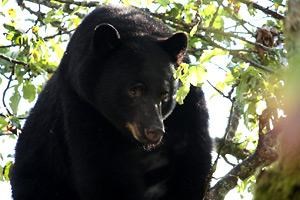Predatory bear activity this spring has triggered a large number of complaints resulting in more than half a dozen bears killed.
In May, the conservation officer service received 36 calls regarding black bears in the area. By mid June it had received 34 calls. In the last six weeks, the agency has had to destroy seven bears.
Conservation Officer Andrew Anaka said what is unusual is the number of calls coming in about predatory black bears, not just bears that get into garbage, compost and bird feeders. The number of bears reported killing livestock—goats, sheep, pigs, chickens and ducks—is increasing. “We’ve had a high number of bears that are killing domestic animals,” he said.
Anaka doesn’t know why this is happening and finds it unusual and disturbing. He said he didn’t think the activity was related to the cold, wet spring. “I think there is just as much food around as every year,” he said. “I think this has to do with population trends and we have a lot of black bears.”
When a bear has to be killed, the incident can be upsetting to people who witness it. Holly Kliauga, who lives in the Powell Lake Mobile Home Park, said she was in her home at the end of May when she heard a loud bang. She went outside and saw a conservation officer holding a gun and heard a bear thrashing in the bush, making grunting noises. “He was panicking. It was very upsetting,” she said.
When she wakes up at night, the first thing she thinks about is the cries of the bear, Kliauga said. “I won’t forget it.”
Kliauga wondered why the conservation officer couldn’t have trapped or tranquilized the bear instead of shooting it. She doesn’t think he should have shot the bear when there were children around and so close to trailers. “If that bullet missed, it could have come right through one of our trailers, which I thought it did. I’m out there checking for bullet holes.”
Residents in the trailer park are used to seeing bears at this time of the year, Kliauga said. “We just ignore them,” she said. “They don’t bother us and we don’t bother them.”
Susan Holmes, who lives in the Tides Mobile Home Park, which is right above Powell Lake Mobile Home Park, said residents knew the bears and their mother. She also questioned why the bear had to be shot. “We never have any problems,” she said. “The bears wander through, then later in the summer they’re gone.”
The bear had a sibling and both were responsible for a number of complaints that came from Chilco and Atlin avenues, Anaka said. Both bears were three-year-old males that weighed about 225 pounds. “The first one was shot,” he said. “The second one was trapped and destroyed.”
One bear was shot because of livestock and the other was a consistent visitor in a shed that had chicken food. “He was just persistently there during the day. He wouldn’t leave. No fear of humans. The same could be said for the second bear as well. He was around all hours of the day, had lost his fear of people and had to be removed for public safety reasons.”
Residents need to be more vigilant than in past years, Anaka added, especially people who have livestock because of the number of predatory bears in the area.
One solution is for the community to become a Bear Smart community. A provincial government program, Bear Smart is designed to diminish the number of human-bear conflicts using proactive methods that identify and eliminate the root causes of conflicts. That initiative would have 100 per cent support from the conservation officer service, Anaka said. While the City of Powell River has to be a full and willing participant, Anaka said, it takes the entire community to become involved.
Interested readers can find more information about the program online.



